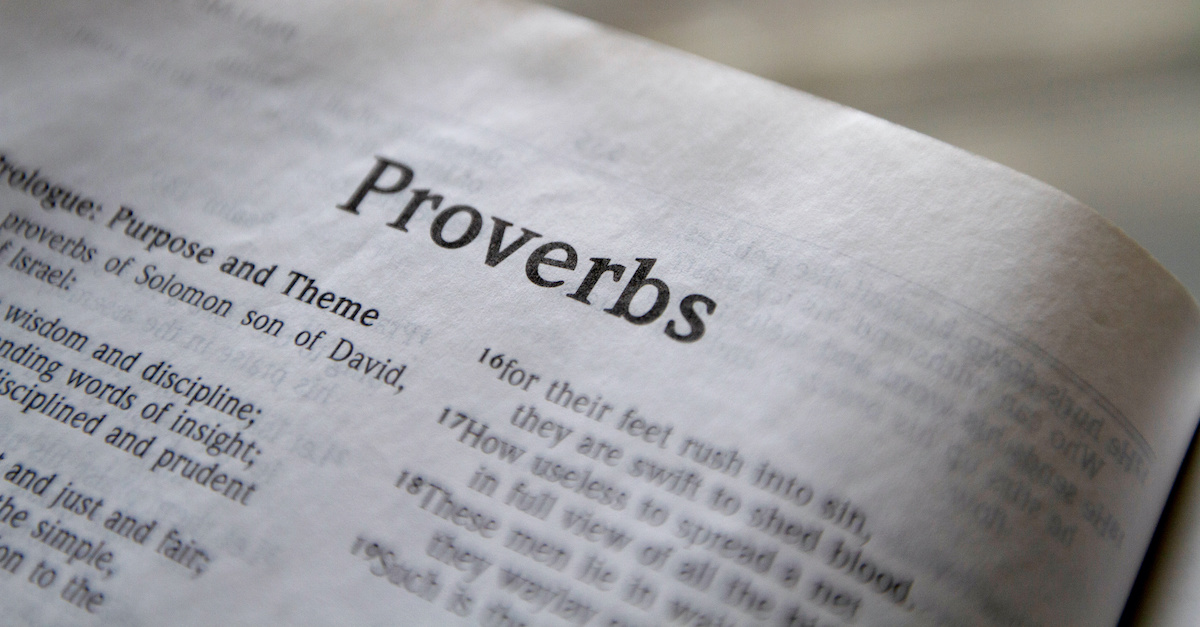
BY ABBY SEITZ
This biblical book of sayings and advice is full of wisdom.
The Book of Proverbs is one of the most quoted books of the Tanakh (Hebrew Bible). Comprising the second book in the Ketuvim (or Writings) section of the Tanakh, Proverbs is full of lines that share wisdom on the importance of centring one’s life and relationships around morality, personal responsibility and the values of the Torah. It gives us such memorable maxims that have seeped into popular culture such as “pride goeth before a fall” (Proverbs 16:18) and “spare the rod, spoil the child” (Proverbs 13:24). It also contains colourful exhortations like “Lazybones, go to the ant; study its ways and learn,” (Proverbs 6:6) and this most constant refrain: “Fear of the Lord is the beginning of knowledge.” (Proverbs 1:7).
Jewish tradition teaches that King Solomon authored the Book of Proverbs; in Hebrew, the book is known as Mishlei Shlomo, or “The Proverbs of Solomon,” though modern scholars set the book’s true completion long after King Solomon’s actual reign. Regardless of who truly wrote and compiled the book, it remains a practical source of guidance on life, love, parenting, handling challenging situations, being a good person and more. Here are 10 lines from Proverbs that exemplify the insightful wisdom found throughout the book.
Translations of the original Hebrew text are from Sefaria. Some translations have been lightly edited.
- “It is a tree of life to those who grasp her, and whoever holds on to her is happy,” (Proverbs 3:18).
For Jews, this is arguably the most well-known line in the Book of Proverbs, because it may be the origin of the idea that wisdom, or more specifically Torah (in the classical Jewish interpretation), is a “tree of life” (etz hayim in Hebrew).
Etz hayim serves as a source of inspiration for everything from Jewish jewelry to the names of synagogues and prayer books. It is also a focal point of the Torah service on Shabbat mornings, in which the line and similar ones from Proverbs are sung as the Torah is taken out.
- “Happy are those who find wisdom…for her income is better than silver, and her revenue better than gold. She is more precious than rubies; All of your goods cannot equal her,” (Proverbs 3:13-15).
While Proverbs is an ancient text, these lines prove that some wisdom is timeless. In our modern consumerist culture, it’s tempting to spend our energy chasing more money, a flashy car or the newest phone. Centuries and centuries later, Proverbs is here to remind us that knowledge is worth more than anything.
- Chamisa under fire over US$120K donation
- Mavhunga puts DeMbare into Chibuku quarterfinals
- Pension funds bet on Cabora Bassa oilfields
- Councils defy govt fire tender directive
Keep Reading
- “A righteous man falls down seven times and gets up,” (Proverbs 24:16).
There are plenty of instances throughout the Tanakh where even the greatest leaders made mistakes and faced hardships and challenges, such as Moses killing the Egyptian or Joseph taunting his brothers. Jewish texts also extensively talk about what it means to be a righteous person, or a tzadik. According to Proverbs 24:16, resilience and determination are central attributes to living a righteous life. But no one gets everything right on the first try.
- “Just like iron sharpens iron, a man sharpens the wit of his friend,”(Proverbs 27:17).
The creation story outlined in Genesis includes a powerful statement from God: “It is not good for mankind to be alone,” (Genesis 2:18). In the Torah, this leads to the creation of Eve whose existence relieves Adam from the burden of being the only human in existence. In Proverbs, we can understand this line to be an extension of that idea, especially since it led to a creation of its own: the ancient Jewish tradition of studying in pairs (havruta in Hebrew). In the Talmud (Taanit 7a), Rabbi Hanina cites this exact line from Proverbs to explain why Torah is best learned in pairs. Having a partner or havruta allows the learner to pose questions, consider other interpretations and master the subject at hand.
- “The mouth of the righteous is a fountain of life, but lawlessness covers the mouth of the wicked,” (Proverbs 10:11).
This line further explains what makes someone righteous: not only their actions, but also their speech. It’s also one of many examples from the Book of Proverbs that condemn lashon hara (Hebrew for “evil speech”). Gossip, slander and rumours all fall under the umbrella of lashon hara, which is forbidden in Judaism.
- “If there is anxiety in a man’s mind, let him quash and transform it into joy with encouragement,” (Proverbs 12:25).
This sentiment is echoed again in Proverbs 17:22: “A joyful heart makes for good health; Despondency dries up the bones.”
Pursuing a life of joy and happiness, even in the face of hardship, is encouraged by various Jewish leaders, most notably by Rav Nachman, the founder of the Hasidic Breslov sect. Rav Nachman is widely known for declaring that “It is a great mitzvah to be happy” and “It is forbidden to be sad.” Rav Nachman’s teachings also acknowledged that struggle and sadness are inevitable and that these emotions should not be ignored, but faced and treated.
Happiness is difficult to achieve in isolation. So much of Judaism is about embracing community — some of the most important mitzvot involve what we can do for others, such as bikkur cholim, or visiting the sick — so it makes sense that this verse would not only encourage us to help our fellow humans, but to specifically bring them back to joy Proverbs 12:25 similarly reminds us of our power to make a change in someone else’s life.










